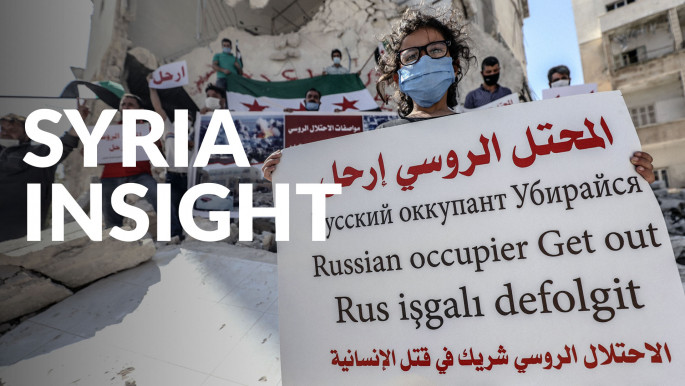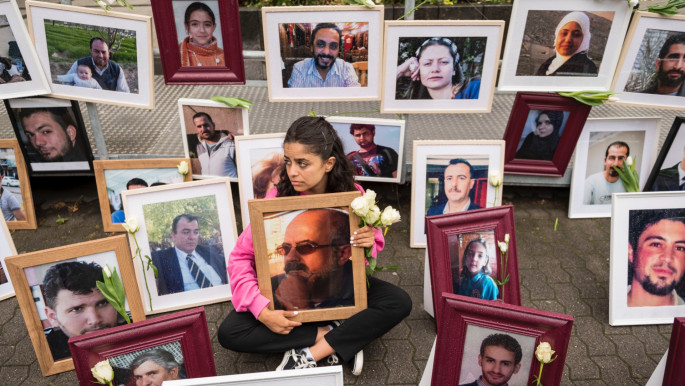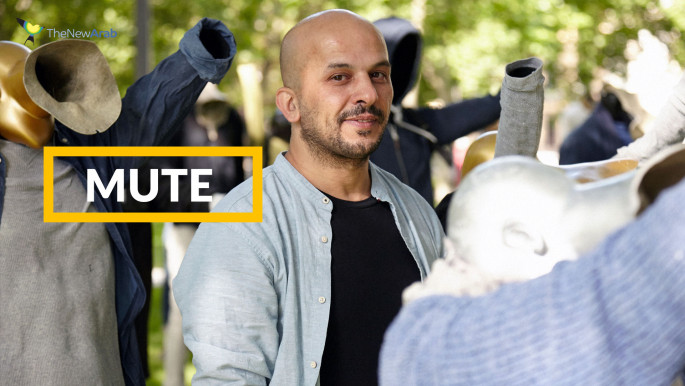Gone but not forgotten: The fight for Syria's disappeared
Almost every day Wafa Ali Mustafa posts a number to Facebook. Today she has counted to 2663. Each number represents a day since her father went missing in Damascus more than seven years ago.
It is a bitter truth that the disappearance of Wafa's father, Ali, is far from an isolated case. More than 130,000 people are believed to be detained and forcibly disappeared in Syria, the majority by the regime.
As the war draws on, becoming ever more complex and affecting more and more Syrians, the fight to remember those missing becomes increasingly difficult.
But Wafa, through the organisation Families for Freedom, is part of a growing network of family members who are tirelessly campaigning for justice, documenting the missing, and telling the stories of their loved ones.
"My father had always been an advocate for freedom and democracy. He took me on my first protest in support of Palestine when I was 10," Wafa told The New Arab. When the revolution broke out in Syria in 2011, both Wafa and her father immediately took to the streets.
Trouble with the regime came when Ali, who previously ran a small business selling frozen fruits and vegetables, helped protestors who fled to the family's home in Masyaf from the crackdown in Hama in July 2011. "He was accused of providing aid to terrorists but these were innocent people who had been attacked," says Wafa.
 |
More than 130,000 people are believed to have been detained and forcibly disappeared in Syria |  |
With Masyaf - "a small town where everyone knows everyone" - becoming increasingly unsafe for opponents of the regime, Wafa's father joined her in Damascus in the summer of 2012 where she had been studying at university before the conflict.
Shortly after, Wafa's best friend was killed by a shell and she fell into a deep depression. It was her father who cared for her in this difficult time. "I collapsed. I couldn't eat. I could barely move. For three months my father did everything for me," remembers Wafa.
 |
|
| Read more: Syria Insight: Russia's intervention five years on (Part 1) |
When Wafa went home to Maysaf to see a doctor, it was agreed her mother would visit Damascus and see her husband. She prepared food for Ali and set off to visit the husband she had not seen in months. They spoke multiple times on the way. When she was fifteen minutes away she called one last time. Ali, sounding excited, told her he had cleaned the house and everything was ready. But when she arrived, Ali did not answer the door.
Neighbours explained that Ali and another man had been taken away by a group of men. That day, Wednesday 3 July, 2013, was the last time Ali has been seen or heard of. The man he was with turned out to be his best friend, whose family would be told a year later had died during torture.
Nothing is known of Ali's whereabouts. "We've tried literally everything," says Wafa. "We paid money. We assigned lawyers. We contacted people from the regime. People who know people from the regime. Anyone who had connections. Anyone who we thought could help."
Wafa says the authorities deny detaining her father. She remains adamant they took him. "It was 2013 in Damascus, in a regime neighbourhood, near to where Assad himself and his family lives. This neighbourhood was never out of the regime's control," she says.
 |
As the war draws on, the fight to remember those missing becomes increasingly difficult |  |
Wafa's father had always asked that his family flee the country if he was ever taken. It was well-known that the families of detainees were often later imprisoned as part of the interrogation process. So within a week of her father disappearing, Wafa, then aged 23, her mother and her younger sister fled to Turkey.
For three years they did what they could to survive. "We were just three women with nothing. No money. I had to work. I worked as a journalist for three years in Turkey. At points I was working three different jobs for 18 hours a day."
 |
|
| Read more: Assad's henchmen: The painstaking hunt for Syrian war criminals in Europe |
In 2016, Wafa went to Berlin to continue her education and connected with Families for Freedom, a network of family members of missing Syrians in Syria. With members in Syria, across the Middle East and Europe, Families for Freedom has become a major voice for those left behind, demonstrating in major European cities - London, Berlin, Brussels - with pictures of their loved ones.
Their demands are simple, for the whereabouts of their loved ones to be revealed, and for the perpetrators of their unlawful detainment - and in many cases torture and murder - to be held accountable for their actions.
 |
That's why I carry my father's picture and the pictures of other missing people. We only exist if we are remembered |  |
In the summer of this year, Wafa was called upon to give evidence to the UN Security Council, telling the council that families of detainees are "deeply frustrated" by the abdication of responsibility to address a crime against humanity.
While the Council acknowledged the seriousness of the situation, no action has been taken, leaving Wafa feeling only more frustration. "We are calling for the UN Security Council to pass a resolution on detention and enforced disappearance in Syria. This would make a real difference, but there doesn't seem to be a will to actually enact change. I did not surprise the UN Security Council members with this demand. We've been calling for this for years.
 |
|
| Read more: 'Mute': A Syrian protest that is louder than words |
What motivates Wafa to keep on going is the memory of her father, but also how much it means to other family members to have their loved ones remembered. "When I first started protesting and holding these photos, I felt it was pointless. But the way that people would thank me was something I never expected. It means the world to them and to me."
After years of inertia, some progress is starting to be made. In April, two former Syrian security officials in Koblenz, Germany, went on trial – the first in the world on state torture in Syria. Evidence submitted has the potential to shed new light on the situation for those detained, as well as lay the ground for bringing further perpetrators to justice as it develops next year.
Recording these stories is in itself an important act of resistance. Families for Freedom is one of a number of Syrian civil society groups working with the International Commission on Missing Persons, based in the Hague, which is setting up a centralised database of all those missing. This is to ensure that when peace does eventually return to Syria, those responsible can be accountable under law.
"The smallest details are important," says Wafa. "This applies to all detainees, all those who were disappeared or kidnapped. That's why I carry my father's picture and the pictures of other missing people. We only exist if we are remembered."
Jan-Peter Westad is a freelance journalist and researcher based in London
Follow him on Twitter: @JanPeterWestad




 Follow the Middle East's top stories in English at The New Arab on Google News
Follow the Middle East's top stories in English at The New Arab on Google News


